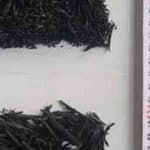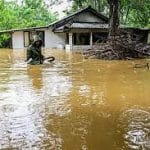Kilifi, Kenya, Feb 24 (AFP/APP): Tangled in seaweed, buried in sand, washed up in rock pools — tattered old flip flops are an eyesore on Kenya’s beaches, flushed out of rivers or carried across the sea from Asia and beyond.
They are the footwear of choice for much of the world but cheap flip flops, like other plastic trash, are polluting oceans and pristine white-sand beaches like Kilifi on the Indian Ocean.
“Rich, poor, everybody has got a pair,” said Lillian Mulupi from Ocean Sole, a Kenyan enterprise that recycles discarded flip flops and other plastic garbage found on beaches and waterways into colourful sculptures and children’s toys.
“Since they’re very easy to afford, when a pair is done you just throw it away and get a new one. So you get a lot of it ending up on our beaches.”
The rising scourge of marine litter will be front and centre when negotiations for an international plastics treaty begin later this month at a UN environment meeting in the Kenyan capital.
Plastic has been found in the smallest of plankton and the largest of whales, and pressure is growing for an international agreement to tackle what has been called an ecological crisis.
Governments are being urged to agree on a treaty framework in Nairobi to curb plastic pollution “from source to sea” and to develop ways of reusing the plastic already in circulation.
Less than 10 percent of plastic is recycled, with most dumped in oceans and landfill.
From “the deepest ocean trench to the Arctic, you are finding plastics”, UN Environment Programme executive director Inger Andersen told AFP in an interview this week.
“You could weep.”
Follow the PNI Facebook page for the latest news and updates.









